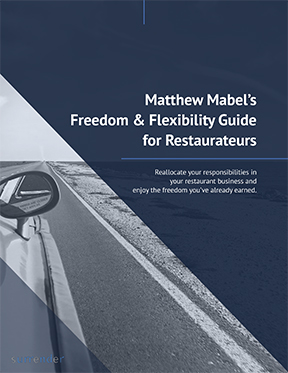
It could be easy to be stuck in your tracks right now.
You look at a flat market, threats of tariffs that can upend the economy, and a stock market that bounces around daily like a basketball players’ “shooters bounce” that goes up and down three times before it makes it through the hoop.
Yet Technomic released data this week that as a group, restaurant owners and operators identify as more positive about the future than consumers.
That may just be in our DNA.
Meanwhile, we know that many concepts succeed today, winners exist in any economy and most of my clients remain on a growth track.
The headlines they read online every day do not hold them back from growing their business.
Maybe you prepare to expand for the first time, identify new ways to drive sales, or improve your business model so you can expand, or have multiple units and you’re embarking into multi-city. Or maybe, in addition to multi-city, you’re adding a second concept.
Either way, if you want to sleep better, plan, organize, and import knowledge from the best restaurant companies in America – do that work in advance, not after you open all those restaurants.
The Hardest Thing You Will Ever Do
“Going from one to two? The hardest thing you’ll ever do!” I hear that message coming out of my mouth often – typically to an operator beginning their journey who hopes to work with me someday or who wants to join my Restaurant Owners Success Club of multi-unit owners.
Running one restaurant lets the owner be there all the time, but the laws of physics say you can’t be in more than one of your restaurants at the same time.
Actually, running multiple units actually may not be the hardest thing; it might be harder to run a second concept, or leave the comfort of your home market.
A second concept brings on a whole new way of thinking – because you have to be able to pivot to the concept you work in at a particular moment, the special approach its guests and employees need, and the differentiated branding, culture, and marketing.
Employees you moved from one concept to another might not fit.
Just being yourself won’t work. You must be addressing each different concept in an appropriate way. Remembering that and adjusting leads to success.
When you start to operate in more than one city, you must do what my “codifying ownership” process provides: have people and systems in place that mirror what you personally provide or contribute.
If not, your influence becomes diluted. You may be home with a panic attack as you watch the cameras from your restaurant 300 miles away.
Make It Easy on Yourself
My clients work with me to protect their company during growth spurts. They adopt the specific different behaviors I have identified that become essential as operators go from the 1-10 unit stage, on to the 10-20 unit size and finally to 20+ units.
If you go multi-unit, multi-city, or multi-concept (some go all three) without appropriate organization, the likelihood of underperforming (or even failure) will increase, and significant money will leak out of your company unseen.
My clients and I protect growth through my Roadmap process, which becomes a guide to avoiding pitfalls.
Your P&L does not have an expense item called “missed opportunity,” so you may not be able to see that. I do.
I have clients building restaurants they committed to years ago. Some simply look for new ways to perfect their operations as they commit to grow, and others continue on a steady growth rate.
Their ability to pivot to what the size of their company requires now turns out to be critical to success.
I focus on constant improvement; they do too.
What does your stretch in multi-unit, multi-concept, and/or multi-city operations look like? And how have you protected yourself from the pitfalls of operating this way?

